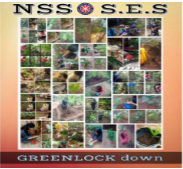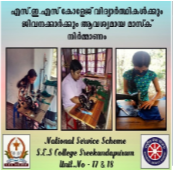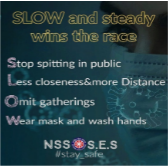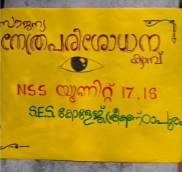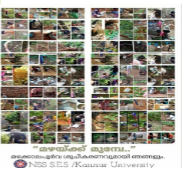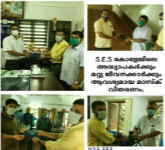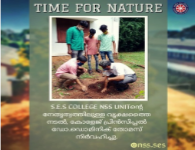National Service Scheme (NSS)

The National Service Scheme (NSS) is a Government-sponsored public service program conducted by the Ministry of Youth Affairs and Sports of the Government of India. Popularly known as NSS, the scheme was launched in Gandhiji's Centenary year in 1969, aimed at developing student personality through community service. The NSS is introduced to develop the spirit of service, cooperation, patriotism, and discipline among the youth of this country. The basic concept of the NSS is to give an extended dimension to the Higher Education system and orient the students to community service while they are studying in an educational institution.
The College has two units of the National Service Scheme (Unit No. 17 & 18 of the Kannur University). The Units facilitate training for 200 students in Social Work. The units have undertaken a number of programs that help the students to have a socially committed attitude in their education. The scheme provides opportunity for the volunteers to participate in camps, social service activities, and also to attend useful classes. The art of living together, and to deal with challenging environment are also learnt from the varying activities of the NSS. It is an academic extension programme at national level, with a view to bring our academic institutions closer to the society. It is an educational programme for personality development of the students through community service. The activities of the units are so framed to fulfill the objectives of the NSS.
NSS Programme officer:
| Unit-17 | Dr. Rejith P P | Dept.of Physics |
| Unit -18 | Silja C | Dept.of Mathematics |
Motto
The Motto of NSS "Not Me But You", reflects the essence of democratic living and upholds the need for self-less service.
OBJECTIVES OF NATIONAL SERVICE SCHEME
The primary objective is the holistic development of the student. The following are the other major objectives:
- Understand the community in which they work
- Understand themselves in relation to their community
- Identify the needs and problems of the community and involve them in problem-solving
- Develop among themselves a sense of social and civic responsibility
- Utilise their knowledge in finding practical solutions to individual and community problems
- Develop competence required for group-living and sharing of responsibilities
- Gain skills in mobilising community participation
- Acquire leadership qualities and democratic attitudes
- Develop capacity to meet emergencies and natural disasters and
- Practise national integration and social harmony
